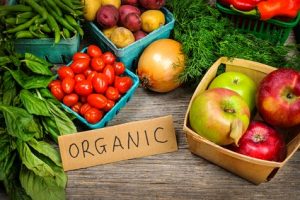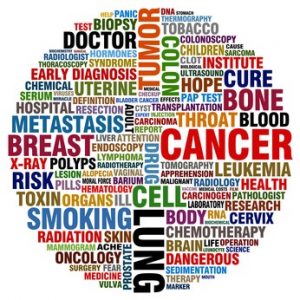Is Eating Organic Worth The Cost?
Author: Dr. Stephen Chaney
 Millions of Americans choose organic foods whenever possible. However, organic foods are expensive, and some experts claim they are a waste of money. That is why recent headlines claiming that eating organic foods decrease cancer risk have created such a stir. I will look at the study behind the headlines below, but first let me summarize what we do know about organic foods.
Millions of Americans choose organic foods whenever possible. However, organic foods are expensive, and some experts claim they are a waste of money. That is why recent headlines claiming that eating organic foods decrease cancer risk have created such a stir. I will look at the study behind the headlines below, but first let me summarize what we do know about organic foods.
I discussed a study comparing organic and conventionally-grown produce in a recent issue, Organic Foods Healthier, of “Health Tips From the Professor”. It was a major study that combined the results from 343 of the best-designed previous studies. The study found that pesticide and herbicide residues were 4-fold lower in organically-raised produce than in conventionally-raised produce. It also found that the polyphenol content of organically-raised produce was slightly higher than in conventionally-raised produce.
Neither of these findings automatically mean that eating organic produce will improve your health. However, there is increasing evidence that pesticide exposure is linked to increased risk of cancer. Thus, it seems logical that eating organic might decrease cancer risk. It is that hypothesis that the current study (J Baudry et al, JAMA Internal Medicine, doi: 10.1001/jamainternmed.2018.4357 ) was designed to test.
How Was The Study Designed?
 This study is part of a major French study called NutriNet-Santé that was launched in 2009. The NutriNet-Santé study is web-based study designed to investigate associations between nutrition and health.Volunteers with access to the internet were recruited from the general population. After agreeing to participate in the study, the volunteers were asked to complete a battery of online assessment forms.
This study is part of a major French study called NutriNet-Santé that was launched in 2009. The NutriNet-Santé study is web-based study designed to investigate associations between nutrition and health.Volunteers with access to the internet were recruited from the general population. After agreeing to participate in the study, the volunteers were asked to complete a battery of online assessment forms.
The baseline data for the NutriNet-Santé study included age, sex, occupational status, education level, marital status, income, number of children, smoking status, physical activity, and diet. Dietary intake was assessed using three 24-hour dietary recalls collected over a 2-week period. Two of the 24-hour dietary recalls were on weekdays and one was on a weekend.
The dietary recalls were used to create a “score” of diet quality. Without going into detail, diets that favored animal protein, animal fats, sweets, and highly processed foods were considered “poor quality diets.” Diets that favored plant proteins, vegetable oils & and omega-3 fats, fruits, vegetables, and whole grains were considered “good quality diets.”
This portion of the NutriNet-Santé was designed to measure the correlation between organic food consumption and cancer risk. Two months after enrollment in the study, the participants were asked to provide information on the frequency with which they chose the organic version of 16 different types of food. From this information each participant was assigned an “organic food score” ranging from 0 to 32 points.
The participants in this study were also asked to complete a yearly health status questionnaire online. If they reported a cancer diagnosis, they were asked to provide their medical records, and the study physicians contacted the patient’s physician to confirm details of the diagnosis.
A total of 68,946 French adults completed the study (78% female, mean age 44.2 years). They were followed for an average of 4.56 years. During this time period there were 1340 new cancer diagnoses in this population.
Do Organic Foods Decrease Cancer Risk?
 The participants were divided into four groups based on their organic food score. When participants with the highest organic food score were compared to those with the lowest organic food score there was a:
The participants were divided into four groups based on their organic food score. When participants with the highest organic food score were compared to those with the lowest organic food score there was a:
- 25% reduction in total cancer risk.
- 86% reduction in non-Hodgkin lymphoma risk. This is not a novel finding. A previous study has also suggested eating organic might reduce the risk of non-Hodgkin lymphoma.
- 76% reduction in all lymphoma risk.
- 34% reduction in postmenopausal breast cancer risk.
The authors concluded “A higher frequency of organic food consumption was associated with a reduced risk of cancer. Although the study findings need to be confirmed, promoting organic food consumption in the general population could be a promising preventive strategy against cancer.”
These are the results and conclusions that made the headlines. However, the scientists who designed the study were aware of previous data showing that people who eat organic are also more likely to eat a healthy diet and follow a healthy lifestyle. Thus, their statistical analysis of the data considered all factors that might influence cancer risk. This analysis provided a much more nuanced interpretation of the data. They found that the association between increased organic food consumption and decreased cancer risk:
- Was significant for women, older adults, individuals with a family history of cancer, individuals who had a poor diet, and former smokers.
- Was seen for people of all weights but was greatest for individuals who were obese.
- Was non-significant for men, younger adults, individuals with no family history of cancer, individuals who had a good diet, never-smokers, and current smokers.
- Was non-significant for other types of cancer.
You are probably wondering “Does this mean organic foods are beneficial for some people, but not for others?” A superficial interpretation of these data might lead to that conclusion, but let’s dig a little deeper.
What Does This Study Mean For You?
 In interpreting a study of this type, it is important to ask whether enough people will develop cancer during the study for the results to be statistically significant. That depends on 3 factors:
In interpreting a study of this type, it is important to ask whether enough people will develop cancer during the study for the results to be statistically significant. That depends on 3 factors:
- The number of people enrolled in the study.
- The duration of the study.
- The probability that participants will develop cancer during the duration of the study.
When you look at the whole study population, all three criteria have been met. There were 68,949 participants who were followed for 4.56 years. During that time 1340 of them developed cancer, of which 459 were breast cancer, 47 were non-Hodgkin lymphomas, and 15 were other lymphomas. A higher frequency of organic food consumption was associated with a decreased in the risk of all these cancers, and that decreased risk was statistically significant. This is the main take-home lesson of the study.
However, when you start to break the study down into subgroups, the number of people in each subgroup and the duration of the study become limiting factors. For example:
- We don’t really know whether eating organic foods are unimportant for men or whether there were too few men in the study for any benefit to be statistically significant.
- Colon cancer and many other cancers develop gradually over a 10 to 20-year period. We don’t know whether choosing organic foods is unimportant for these cancers or whether 4.56 years is too short a time to show a significant benefit.
- The same is true for several of the other variables in this study. For example, if you are an older adult, have a family history of cancer, have a bad diet, and/or have smoked in the recent past, your probability of developing cancer over a 4.56-year time period is relatively high. On the other hand, if you are younger, have no family history of cancer, have a good diet, and have never smoked, your probability of developing cancer during that same time period is very low.
So, how do we interpret the data with these subgroups? We could conclude that eating organic foods in unimportant for people who are young, have no family history of cancer, have a good diet, and have never smoked. A more likely interpretation, however, is that people in these groups have such a low risk of cancer that 4.56 years is too short to demonstrate a benefit of organic foods. It might require a 10, 20, or 30-year study to show benefit of organic foods for these people.
Let me close with three important observations:
- People often say too me: “I can’t afford organic fruits and vegetables, but I am concerned about pesticide exposure. Does that mean I should avoid fruits and vegetables?” The data from this study provide a clear answer. Eating lots of fruits and vegetables is beneficial even if you can’t afford organic.
[I also let them know about “The Dirty Dozen” ( Rank Produce Items By Pesticide Level ). This is a list of the fruits and vegetables most likely to be contaminated with pesticides. If your budget for organic foods is limited, these are the most important fruits and vegetables to spend it on.]
- I find it ironic that people who consume a poor diet are the ones most likely to experience an immediate benefit from choosing organic foods. This is, of course, the group that is least likely to eat organic.
- If you smoke, eating organic probably isn’t going to help you much. Your best bet is to stop smoking.
The Bottom Line
A recent study looked at the association between organic food consumption and cancer risk. When participants who consumed organic foods frequently were compared to those who almost never consumed organic foods there was a:
- 25% reduction in total cancer risk.
- 86% reduction in non-Hodgkin lymphoma risk. This is not novel. A previous study has also suggested eating organic might reduce the risk of non-Hodgkin lymphoma.
- 76% reduction in all lymphoma risk.
- 34% reduction in postmenopausal breast cancer risk.
The authors concluded “A higher frequency of organic food consumption was associated with a reduced risk of cancer. Although the study findings need to be confirmed, promoting organic food consumption in the general population could be a promising preventive strategy against cancer.”
These are the results and conclusions that you have seen in the headlines. However, the scientists who designed the study were aware of previous data showing that people who eat organic are also more likely to eat a healthy diet and follow a healthy lifestyle. Thus, their statistical analysis of the data considered all factors that might influence cancer risk. This analysis provided a much more nuanced interpretation of the data, which I have discussed in the article above.
For more details read the article above.
These statements have not been evaluated by the Food and Drug Administration. This information is not intended to diagnose, treat, cure or prevent any disease.
